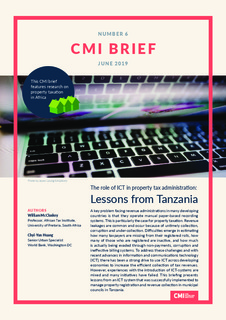The role of ICT in property tax administration: Lessons from Tanzania
Report
Permanent lenke
http://hdl.handle.net/11250/2600658Utgivelsesdato
2019-06-01Metadata
Vis full innførselSamlinger
- Publications [1488]
Originalversjon
Bergen: Chr. Michelsen Institute (CMI Brief no. 2019:06) 4 p.Sammendrag
A key problem facing revenue administrations in many developing countries is that they operate manual paper-based recording systems. This is particularly the case for property taxation. Revenue leakages are common and occur because of untimely collection, corruption and under-collection. Difficulties emerge in estimating how many taxpayers are missing from their registered rolls, how many of those who are registered are inactive, and how much is actually being evaded through non-payments, corruption and ineffective billing systems. To address these challenges and with recent advances in information and communications technology (ICT), there has been a strong drive to use ICT across developing economies to increase the efficient collection of tax revenues. However, experiences with the introduction of ICT-systems are mixed and many initiatives have failed. This briefing presents lessons from an ICT system that was successfully implemented to manage property registration and revenue collection in municipal councils in Tanzania.
